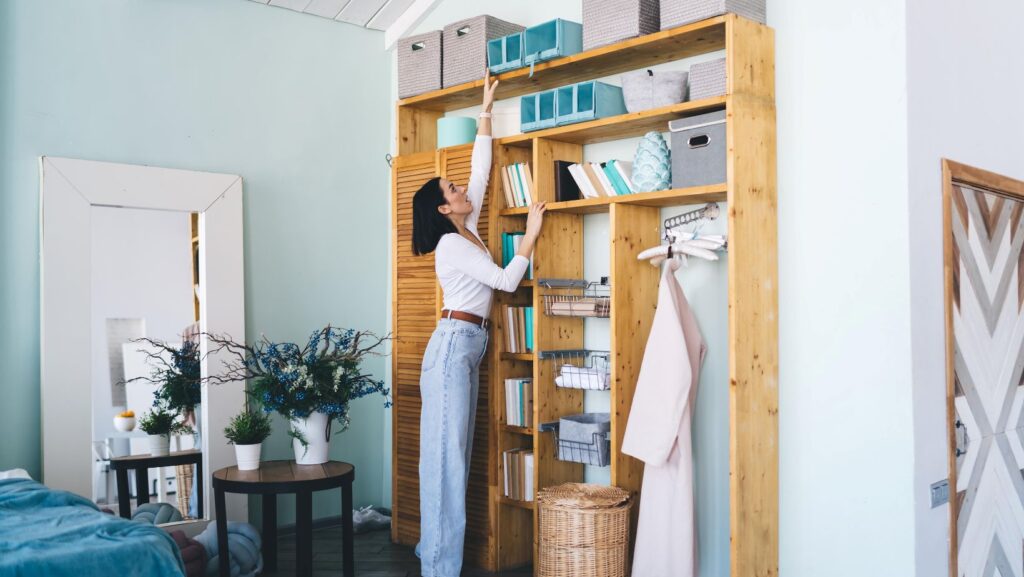
A cluttered home can be a drag for every homeowner. Walking into a messy room is never fun when all you can think about is getting a much-deserved rest.
Disorganized living spaces aren’t just an aesthetic issue. It can also negatively impact our mental health and wellbeing. Besides contributing to stress, too much stuff can affect mental clarity and productivity, making it challenging to stay on top of things.
Thankfully, creating organized spaces isn’t as impossible as it sounds. In this guide, we’ll provide practical tips to transform your home into a clutter-free haven. Let’s discuss the connection between wellness and clutter before outlining the strategies for creating organized spaces.
The Impact of Clutter on Wellbeing
You may not realize that too much stuff affects your overall wellness. Clutter leads to heightened stress hormone levels called cortisol and feelings of fatigue—whether in the office or at home. Here’s how:
Visual Overload
Our brains crave order. When surrounded by clutter, the visual noise becomes overwhelming, making it difficult to relax and focus.
Decision Fatigue
Clutter bombards you with choices—”What should I wear?” ” Where’s that important document?” This constant decision-making can lead to mental fatigue.
Reduced Productivity
Clutter can be a physical and mental barrier, hindering your ability to complete tasks efficiently.
Poor Sleep Quality
A messy bedroom environment signals your brain that it’s not an ideal rest zone. And lack of sleep can trigger negative emotions like irritability and feelings of anxiety, frustration, and even shame.
Beyond the mental and physical impacts, rampant disorganization makes regular household tasks more arduous. Mundane chores become major headaches if you’re constantly misplacing items or rummaging through overstuffed closets. Not exactly a recipe for relaxation!
A Step-by-Step Approach to Decluttering
Now that you’re sold on the benefits, let’s dive into specific strategies for bringing order to your domain. Here are some practical steps to get you started:
1. Start Small
Overhauling an entire house at once is a surefire way to get overwhelmed. Begin with a single room or even just one problem area like a closet or kitchen cabinet. Bite-sized tasks are infinitely more manageable.
2. Declutter Ruthlessly
Channel your inner Marie Kondo and start purging items that don’t “spark joy.” Clothes you haven’t worn in ages, duplicate household items, ancient electronics—it’s all got to go. Be brutally honest with yourself about what you truly need.
3. Organize Internal and External Storage Spaces
If you’re not ready to part with some of your sentimental items, consider renting a space at Storology Storage 1951 E Grande Blvd, Tyler, TX, 75703, or similar providers near you. Doing so ensures your valuables remain safe without occupying massive spaces in your home.
Additionally, group similar items together. Clearly labeled bins and smart furniture layouts can work wonders. This makes them easier to find and creates a sense of visual order. Bins, baskets, shelving units, and other organizational tools are your best friends here.
4. Embrace Multifunctional Furniture
Invest in furniture that serves multiple purposes. Ottomans with storage compartments, beds with built-in drawers, and foldable tables can help maximize space and minimize clutter.
5. Avoid Accumulating Paper
We all receive and tend to keep astonishing amounts of papers, mail, and miscellaneous documents over time.

Invest in a heavy-duty shredder and start eliminating anything you don’t require for tax, legal, or sentimental purposes.
6. Use Technology to Your Advantage
Numerous apps and online resources are available to help you on your decluttering journey. These tools can offer organizing tips, provide checklists, and even help you sell or donate unwanted items you no longer need.
7. Make Decluttering a Habit
Maintaining an organized home is an ongoing process, not a one-and-done chore. Once you’ve achieved an organized space, the key is to keep it in order. Adopt these helpful habits:
8. Do The 10-Minute Tidy
Dedicate 10 minutes each day to putting things back in their place. This small daily action can prevent clutter from accumulating.
9. Practice The One-In, One-Out Rule
For every new item that enters your home, get rid of an old one. This keeps the overall amount of stuff in check.
10. Schedule Regular Decluttering Sessions
Schedule regular decluttering sessions, say quarterly or biannually, to revisit your belongings and ensure nothing unnecessary creeps back in.
Getting organized requires reframing your mentality around possessions. Our society encourages a “more is more” mindset of needless accumulation. But the truth is, we could all benefit from paring down to pursue a simpler, lighter way of living. Embrace the idea that physical belongings do not equal happiness or personal worth. Letting go of the emotional attachments to objects is incredibly freeing.
Additional Tips for Organizing Your Home
Decluttering is just one piece of the puzzle. Here are some additional tips for crafting a calming and organized space, especially when moving to a new home:
1. Natural Light is Key
Open those curtains and blinds! Natural light brightens your space and boosts mood and energy levels.
2. Embrace the Power of Plants
Indoor plants add a touch of nature and clean the air, promoting a sense of well-being.
3. Use Calming Color Palettes
Soft blues, greens, and neutrals have a calming effect. Consider incorporating these colors into your walls, furniture, and décor.
4. Adopt a ‘Less is More’ Principle
Avoid clutter by displaying only a few cherished decorative items. Rotate them occasionally to keep things fresh.
5. Create Designated Zones
Establish specific areas for work, relaxation, and entertainment. This helps maintain order and prevents clutter from spilling over into other areas.

For example, creating a specific spot for your workout gear makes exercising more convenient. An organized kitchen encourages home cooking over ordering in. You may even find yourself sleeping better with a streamlined bedroom.
The Bottom Line
Creating an organized, clutter-free living space is one of the greatest gifts you can give to your overall wellness. You’ll feel an incredible sense of calm just by entering a tidy, clutter-free room. Less mess equals less stress—it’s really that simple.
Implementing the strategies in this guide can help you create a living space that contributes to your well-being. However, staying on top of an orderly home is a journey rather than a destination. Expect some setbacks, but don’t be discouraged. Celebrate small wins and be kind to yourself. More importantly, embrace a minimalist mindset before rolling up your sleeves and creating a space that sparks joy, tranquility, and a renewed sense of calm.






